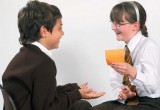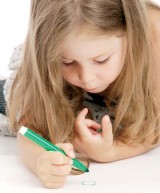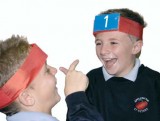Try these maths games in the classroom. While children think they’re playing, teachers know they’re learning, says Paul Broadbent...
Playing games in their many guises is an important part of growing up. Winning, losing and simply taking part is a learning experience in itself, so if mathematical skills or concepts are included in the mix, they can make a very useful addition to your teaching.
So what makes a good game? Firstly, it should involve friendly competition, with the possibility of winning or losing. If there are children with a range of abilities playing, then an element of luck is desirable as it makes it possible for any child to win. Simplicity is important – if it is easy to understand and play then there is more chance of remembering the rules when the game is played again. For the teacher, adaptability is useful; can the game be easily ‘tweaked’ to simplify it or make it more challenging? Importantly, the game should be fun – it needs to be enjoyable so that children are involved and interested and want to play again.
Most of the games featured in this article are for the whole class to play together, or for groups of volunteers to play in front of the class. They are all adaptations of old favourites, making it easier for children to pick up the rules and get stuck in.
 You need
You need
• 20-30 maths vocabulary cards – with appropriate words from recent maths lessons written on individual cards
• A timer
To play
1. The aim of this game is to see how many words can be guessed in one minute. Put all the vocabulary cards into a ‘lucky-dip’ bag, or stack them in a pile, face down.
2. Ask a pair of children to come to the front and give one child the bag or stack of cards.
3. Start the timer as one player looks at the first card and describes the word to their partner, without saying the word itself. s soon as their partner guesses the word the next card can be turned over or taken out.
4. After a minute, the number of correctly guessed words is recorded. Other pairs can then come to the front to try to beat that score. The winning team is the pair with the most words correctly guessed.
Adaptations
• Play for two minutes with pairs swapping after one minute so that roles are reversed.
• Include ‘banned’ words on each card that the children are not allowed to use.
 You need
You need
• 8 maths vocabulary cards – each featuring appropriate words from recent maths lessons
• Pencils and large pieces of paper
To play
1. Give each team a large piece of paper and pen or pencil. Keep the eight vocabulary cards stacked in a pile with the words hidden from the children.
2. Call an individual from each team to come up to and show them the top word in the set of cards. They then go back to their group and try to draw pictures to represent the word, while the rest of the team try to guess the word. Symbols or words are not allowed to be drawn.
3. As soon as a team correctly guesses,another child from the group should come up to you and tell you the word. You can then give them the next word in the set to draw for their team.
4. Players from the other teams should only be shown the next word once their team has also correctly guessed the previous word. The winning team is the first to correctly guess all eight words.
Adaptations
• Reduce or increase the number of words
 You need
You need
• Three large labels with ‘Always’, ‘Sometimes’ and ‘Never’ written on them • A set of 10-12 ‘Prove it’ cards (see examples below)
To play
1. Place the three labels on the wall or on chairs equidistantly around the hall so they can be easily seen. Ask the children to stand in the middle of the hall while you read out one of the ‘Prove it’ statements. For example:’ A triangle has one line of symmetry. Is this always, sometimes or never true?
2. Give them 10-15 seconds to think about the statement and then shout ‘Runaround!’ The children must quickly dash to the label they believe matches the statement.
3. Once they are all standing by the labels, give them 10 more seconds thinking time and then shout ‘Runaround!’ again. This gives them the opportunity to stay where they are or move to another position.
4. After they have finalised their positions, announce the winning group, for example ‘A triangle sometimes has one line of symmetry’.
5. Ask the winning group how they could prove the statement is true, using a whiteboard or other resources if necessary. Repeat the game again with a different ‘Prove it’ statement.
Adaptations
• After each ‘runaround’ only the children with the correct answer continue, with the rest of the children watching, until reduced to a winning group or individual.
Prove it cards
Always, sometimes or never? A cuboid has rectangle faces
Always, sometimes or never? Half an even number is even
Always, sometimes or never? Square numbers have an odd number of factors
Always, sometimes or never? Prisms have two triangle faces
Always, sometimes or never? The angle sum of a quadrilateral is 360°:
Always, sometimes or never? 12/15 is an equivalent fraction to 3/4
Make the best use of your teaching time…
Group or paired games should not be teacher intensive. They should free you up to work with other pupils in the class. Having said that, a little bit of quality time spent playing a game with a pupil is hugely beneficial in building relationships as well as assessing the strengths and weaknesses of individuals.
Make 15
You need
• A 3x3 grid
• Number cards 1-10 to fit on the grid
To play
This is a variation of noughts and crosses. Players take turns to place any number card on the grid. A player making any line totalling 15 is the winner
Adaptations
• Discuss tactics – is it best to start or go second? Where is it best to place a number? Which number is best to choose first?
• Increase to a 4x4 grid and number cards to 15. The target total can be 20.
Paul Broadbent, an experienced primary teacher, is currently a full-time writer and maths consultant. He is a best-selling author of over 250 maths books, with recent texts published in Nigeria, the Middle East and the UK. Paul also has a worldwide reputation for inspiring teachers through his courses on primary teaching and the learning of mathematics. To find out more, visit http://www.broadbent-maths.co.uk
 Thanks to Philip & Tacey, we have one of Paul Broadbent’s Maths Workout Kits to give away. It contains a treasure trove of ideas and resources that will energise your numeracy lessons. For your chance to win this frenetic resource, send your name and address to .(JavaScript must be enabled to view this email address) before the 30th September 2009. http://www.philipandtacey.co.uk 0845 123 7760
Thanks to Philip & Tacey, we have one of Paul Broadbent’s Maths Workout Kits to give away. It contains a treasure trove of ideas and resources that will energise your numeracy lessons. For your chance to win this frenetic resource, send your name and address to .(JavaScript must be enabled to view this email address) before the 30th September 2009. http://www.philipandtacey.co.uk 0845 123 7760
Pie Corbett’s bike poems
Topic
